- Home
- Gustave Aimard
Les chasseurs d'abeilles. English Page 18
Les chasseurs d'abeilles. English Read online
Page 18
CHAPTER XVII.
A DELICATE FEDERAL ATTENTION.
We will run before the corporal, in order to explain to the reader whathad happened in the _rancho._
At first everything went off well. After the first moment of distrustand fear, the muleteers and wagoners, involuntarily submitting to theinfluence of their favourite pastime, had utterly forgotten theirapprehensions, and fraternised with the soldiers. The _aguardiente_went round uninterruptedly from one end of the room to the other; themerriment increased in proportion to the draughts, which, by frequentrepetition, began to heat the brains of the drinkers, among whom thefirst symptoms of drunkenness were showing themselves here and here.
Nevertheless the lieutenant, Don Torribio, his eyes sparkling and hiscountenance excited, continued to sing, to torture the guitar, andspecially to drink, without any signs of meditated evil; and perhapsall might have ended well, but for an incident which suddenly changedthe aspect of things, and turned a scene of joy into a spectacle ofterror.
One of the best and most brilliant dancers of the _zambacueca_ was ayoung muleteer of from twenty to twenty-five, with fine and intelligentfeatures, well-knit figure, and easy manner, who distinguishedhimself greatly by the lightness and grace of his dancing. The womencrowded round him, cast the most killing looks at him, and applaudedextravagantly the eccentric steps it was his pleasure to execute.
Among these females were two, both girls of sixteen, radiant with thebeauty peculiar to South America, and which finds no equivalent inEurope. The black eyes, shaded by long silken lashes; the mouth, withlips red as the fruit of the _chirimoya_ (Mexican pear); the face,slightly bronzed by the heat of a tropical sun, over which fell thelong tresses of bluish-black hair; the rounded figure, supple andslender; the wavy movements, full of inimitable grace; all these charmsunited constituted that intoxicating and voluptuous kind of beauty,which it is impossible to analyse, but of which the most frigid mortalcannot resist the magnetic influence and fascinating spell.
These two females made themselves conspicuous by the exuberant praisesthey showered on the object of their predilection. The latter, wemust do him the justice to say, seemed to take very little notice ofthe enthusiasm he excited. He was a good fellow, whose heart, if nothis head, was perfectly free; who danced for dancing's sake, becauseit pleased him, and because the rough life he led rarely afforded anopportunity for enjoying his favourite amusement; moreover, he wastotally indifferent about inspiring either one or the other of hisadmirers with any kind of passion whatever. The two latter, althoughwith a woman's innate instinct they understood his indifference, andwere secretly hurt at it, nevertheless continued to lavish on him themost passionate expressions of admiration of which the Spanish languageis capable, as a means of evincing the interest they took in hisproceedings.
These demonstrations grew at last so lively and pointed, that thegreater number of the men present--who would each, in his secretheart, have given a good deal for the preference of either of thesebeautiful creatures--began, as is generally the case, to hate themuleteer for the indifference he displayed, and to upbraid him forserious want of politeness and unpardonable ignorance of good manners,in showing no gratitude for such enthusiastic praise.
The muleteer, embarrassed by the position in which he had involuntarilybeen placed while he was only laudably endeavouring to amusehimself, and compelled, as we may say, by his companions' murmurs ofdisapprobation, to re-establish his impugned reputation for courtesy,decided on finding some means or other of withdrawing honourably fromhis disagreeable situation, and with that purpose determined to ask thetwo girls to dance with him one after the other.
Full of these good intentions, as soon as the lieutenant--who hadtemporarily interrupted his inharmonious strumming to help himselfto an immense goblet of _aguardiente_--began to rattle a fresh_zambacueca_ on his guitar, the _arriero_ advanced with a smile on hislips, and graciously saluted the two girls.
"Senorita," said he, to the one who chance to bed nearest, "will youmake me happy by dancing this _zambacueca_ with your humble servant?"
The girl, all rosy with delight at what she imagined the preferenceof the handsome dancer, was coming forward with outstretched hand,and beginning to reply, when suddenly her companion, who had turnedpale on hearing the _arriero's_ invitation, bounded between them likea tigress, and, with trembling lips and flaming eyes, confronted theyoung couple.
"You shall not dance together!" she cried in menacing tones.
The spectators of this extraordinary and unexpected scene recoiled inamazement: they were unable to comprehend this sudden burst of anger.The two would-be dancers exchanged looks of astonishment.
The situation grew intolerable, and the _arriero_ determined to put anend to it.
The second girl was still standing right in front of him, her figureslightly thrown back, and firmly planted on her feet, her head erect,her cheeks inflamed, her nostrils quivering like those of a wild beast,and her arm extended in an attitude of menace and defiance.
The _arriero_ took a step forward, and made a very respectful bow tothe damsel.
"Senorita," said he, "allow me to remark--"
"_Calle Vd. la boca_" (hold your tongue), "Don Pablo!" she angrilyexclaimed, interrupting him in the middle of his speech; "I havenothing to say against you; but look at this _chola sin vergueenza_"(shameless hussy), "who, knowing you to be the best dancer in the_rancho_, wants to monopolise you for her own benefit."
On hearing the insult her companion had thus boldly cast in her teeth,the other damsel hastily shook off Don Pablo, and placed herself faceto face before her assailant.
"You lie, Manonga!" cried she: "It is jealousy that made you utterthese words; you are furious at the preference with which this_caballero_ honours me."
"I!" said the other disdainfully; "You are a fool, Clarita; I care nomore for the _caballero_ than for a sour orange."
"Indeed!" sneered Clarita; "Then, pray what may be the reason of thissudden fury?"
"Because," sharply retorted Manonga, "I have known you for a long time;you want a lesson, and I am going to give you one."
"You, indeed!" said the other, shrugging her shoulders; "Take care lestyou get one yourself!"
"_Ojala_; add another word, and, by my soul, I will knife you!"
"Pooh! you don't even know how to handle a navaja" (knife).
"_A ver;_" (we will see), shouted Manonga, beside herself with rage;and, bounding back, she drew a knife from her bosom, wrapped her_rebozo_ (veil) round her left arm, and threw herself on guard.
"_A ver;_" screamed Clarita, echoing the words, and taking up herposition with the same celerity as her adversary.
A duel between the two girls was imminent.
Don Pablo, the innocent cause of this combat, had several times vainlytried to mediate between the two females. Neither one nor the otherwould listen to his speech, nor attend to his remonstrances. Whenmatters had reached this point, he wanted to make a fresh effort: butthis time he was more sharply repulsed than before; for the bystanders,interested in the dispute, and infinitely attracted by the longingto see a duel with knives between two women, turned against him, andperemptorily bade him be quiet, and leave the _ninas_ (darlings) toamuse themselves as they thought fit.
The _arriero_, thoroughly satisfied that he could wash his hands of theconsequences, and whose good nature alone had induced him to attemptto prevent an explosion, saw that his mediation was looked upon withan unfavourable eye, so thought he had said his say; and, folding hisarms, prepared to be, if not an indifferent, at least a disinterestedspectator of the coming struggle.
It was, indeed, a singular and striking spectacle to see, in this dimlylighted room, amidst the crowd of strange costumes, these two girls,fiercely and resolutely standing two paces apart, ready to come toknife thrusts, while the music and the dance continued as if nothingwas the matter, while the _aguardiente_ was poured forth in floods, andwhile the merriest and maddest songs were shouted out around them.
"With the whole length of the blade, _alma mia_" (my soul), answeredManonga; "I mean to leave my handwriting on your face!"
"Ah, _punaladas!_ We shall see. Are you ready, my dear?"
"As soon as you like, my pet!"
A ring was formed round the damsels, who, with bodies bent forward,left arms extended, and eye watching eye, waited, with felineimpatience, for a propitious moment to rush upon each other.
They seemed well matched, both being young, active, and full of nerve.The _connoisseurs_ in those matters, of whom there were many in theattentive crowd of bystanders, could form no opinion on the result ofthe combat, which threatened, for the matter of that, to be desperate,such flashes of ire sparkled from the wild eyes of the duellists.
After a moment or two of hesitation, or more properly speaking ofgathering themselves up, Clarita and Manonga began to clack theirtongues against their palates, producing a series of sharp smackingsounds; their blue gleaming knives glittered, and they darted upon eachother.
But if the attack was lively, the defence and the parry was not lessso. Both simultaneously bounded back, and fell into guard again. Eachstroke had told; the battle had begun bravely, and either combatant hadher face furrowed by a bleeding double cut. Neither one nor the otherhad predicted falsely: each bore the handwriting of the other on hercountenance. The bystanders trembled with joy and admiration: neverbefore had they been spectators of such a splendid _navajada._
After taking breath for a while, the damsels were preparing torecommence the fight, this time with the determined purpose of makingthe bout decisive, when, all of a sudden, the ranks of the onlookerswere shouldered right and left, and a man resolutely thrust himselfbetween the two adversaries, and confronted them with a look of scorn.
"Hearken, _demonios!_" he cried in a sharp tone, and with accents ofindescribable mockery.
The two women lowered their knives, and stood motionless, with eyesabashed, but head erect, their foreheads frowning, and preserving theirattitude--the haughty expression of two foes who long to tear eachother to pieces, and unwillingly succumb to commands, which they darenot disobey, though they curse them.
In spite of the deafening uproar the federalist lieutenant made withhis guitar, he could not help hearing, at last, what was going on inthe room. At the first impulse, he had placed his hand on the pistolswhich hung at his girdle; but an instant afterwards his anger grew, notcalm, but cold and concentrated, instead of furious.
Don Torribio had risen from his seat, left the bench on which he satenthroned, and furtively approached the combatants. He had attentivelywatched the different phases of the fight, and when he thought properto interfere, had suddenly interposed between the duellists.
The soldiers had silently advanced behind their officer; they were nowclose at his heels, their hands on their weapons, ready for action atthe first signal, foreseeing that Don Torribio's interference in thisquarrel would speedily bring about another, in which they would have totake part.
Intuitively, the ring formed by the _arrieros_ and wagoners hadextended itself, and a large space was left open in the middle of theroom. The two girls stood in the centre of the circle, knife in hand;and the lieutenant, with his arms crossed, amused himself by examiningthem narrowly, with a cynical sneer on his lips.
"Holloa, my chickens!" said he; "What! Are you ruffling your feathersfor a cock? Is there only one on the perch? _iRayo de Dios!_ Whatsplendid St. Andrew's crosses you have dug in each other's faces! Areyou both mad for love of this _picaro?_" (ragamuffin).
Neither spoke; and the lieutenant continued his sarcastic speech:
"But where is this valiant champion, who lets the women fight for him?Does his modesty make him hide himself?"
Don Pablo came forward, looked the lieutenant straight in the face, andanswered firmly: "Here I am."
"Aha!" said Don Torribio, staring at him for some time; "You are intruth a handsome fellow. I do not wonder at their passion for you."
The _arriero_ remained mute, fully understanding the irony of thecompliment.
"There, _ninas_," the lieutenant went on speaking to the damsels,"which of you is the chosen one of this breaker of hearts? _iMilrayos!_ Speak out!"
There was an interval of silence.
"Oh, that is it!" resumed Don Torribio; "You do not exactly know. Come,young fellow, do you speak, and tell me which of the two you prefer."
"I have no preference for either," said the _arriero_ coolly.
"_iCaramba!_" exclaimed the lieutenant, with pretended admiration;"_que gusto_" (what good taste.) "So I am to understand you love themboth alike?"
"No; you are mistaken, senor. I love neither one nor the other."
"_iRayas pues!_ That is a puzzler; and yet you let them fight for you.That is conduct worthy of chastisement, my master! As that is thecase, I shall reconcile you two senoritas, and give a lesson to thediscourteous _caballero_ who flouts at the power of your black eyes.Upon my soul, such an insult calls for vengeance."
The spectators of the scene felt their hearts sink within them, whilethe soldiers laughed and jested among themselves.
On pronouncing his last words, the lieutenant drew a pistol fromhis belt, cocked it, and presented the muzzle at the breast of the_arriero_, who, motionless as ever, had made no gesture to escape thefate that threatened him.
But the two girls were roused. With the velocity of thought, they bothat once threw themselves before him.
Manonga felt her breast pierced by the ball. "Alas!" she cried; "Youdespise me! What does it matter? I die for you! Clarita, I forgive you!"
Don Pablo bounded over the body of the luckless wretch, whose dyingeyes still sought his, and threw himself, knife in hand, on thelieutenant. The latter hurled his heavy pistol at his head; but the_arriero_ avoided the weapon, seized the officer round the body, anda deadly fray began. Clarita, with flaming eyes, eagerly watched thestruggle between the two, ready to interfere as soon as an opportunityoffered in favour of her beloved.
The bystanders were horrified; the dread inspired by the soldiers wasso great, that although many more in number, and all armed, they darednot go to the assistance of their comrade.
In the meantime, the soldiers, more than half-drunk, seeing theirofficer struggling with a stranger, unsheathed their swords, and struckright and left among the crowd, shouting out their dreaded cry:
"_iA degueello! iA degueello! los salvajes unitarios_" (Death, death tothe savage Unitarians!)
Then ensued a scene of horror in the room, which was crowded with humanbeings.
The _arrieros_, pursued by the soldiers, who were pitilessly cuttingthem down, and calling to each other to slay, thronged towards the doorto escape impending death. The disorder was at its height; all wantedto escape at once through the too narrow outlet. Made selfish by fear,and in the blind instinct of self-preservation, they stifled each otheragainst the walls, crushed each other underfoot, and struck blindlywith their knives, in order to hew themselves a passage through thehuman barrier that checked them.
Fear, when self-preservation is uppermost, makes man more cruel andcowardly than the wild beasts. That hideous egotism, which lurks atthe bottom of the human heart, starts up when its bonds are suddenlybroken. Man has then neither parents nor friends; he is deaf to everyprayer; and, shutting his eyes, plunges forward with the blind andstupid ferocity of the maddened bull.
Blood soon flowed in torrents, and the victims increased in number,while the fury grew no less; nor did the assailed attempt to defendthemselves.
At last the barrier gave way, and the wretches rushed out of doors,flying straight on, without knowing whither, in the sole thought ofescaping from the butchery.
At this moment the corporal entered the room. A lamentable spectaclemet his eyes: the floor was strewn with dead bodies, and wounded menweltering in their blood.
But he could not restrain a
cry of horror when his eyes fell on DonTorribio. The lieutenant was tying the head of Don Pablo, which he hadhacked off with his sword, to the long tresses of the fainting Clarita.The officer had been slightly wounded by the girl in the hip and arm,and blood was flowing from his garments.
"There," said he, having finished to his satisfaction the knot thatbound Clarita's tresses to the long locks of the _arriero;_ "since sheloves him so dearly, when she comes to herself she can admire him atleisure, he is all her own now; no one will take him from her."
Then he looked for a time at the pale and fainting girl, with anexpression of lust impossible to describe.
"Pooh!" said he, with a shrug of the shoulders; "Why should I? Let uswait till she opens her eyes. I shall have plenty of time to make loveto her; and I want to enjoy her surprise when she wakes up."
And without another look at his victims, he set himself to help hissoldiers in the massacre.
The first step he took, he encountered Luco.
"Halloa!" cried he; "where have you been, while we have been cuttingup the _salvajes unitarios?_ God take me! Here you come quietly; yoursword in the sheath, and not a drop of blood on your clothes! What isthe meaning of this conduct, comrade? Are you turned traitor, too, bychance?"
At this accusation the corporal feigned immense indignation. Hefrowned, bit his lip, and drew his sword, which he brandishedmenacingly.
"What words are those, lieutenant?" cried he. "Do you address suchan insult to me? Do you call me, the most devoted partisan of ourwell-beloved General Rosas, a _salvaje unitario? iVive Dios!_"
"Come, come; calm yourself," answered the lieutenant, who, like all menof his calibre, was as cowardly as he was cruel, and was intimidated bythe pretended anger of the corporal; "I did not mean to insult you! Iknow you are to be trusted."
"It is well you say so," replied Luco; "for I have no mind to listenpatiently to unjust reproach."
"Lose no more time in talking," said a soldier, interfering; "_irayo deDios!_ I have a capital idea."
"What is it?" asked Don Torribio. "Out with it, Eusebio, or it willblow you up."
The soldier laughed.
"This old hovel," said he, "is full of forage. Let us set fire to it,and roast in the flames all the _salvajes unitarios_ who are here."
"_iVive Dios!_" cried Don Torribio, in high glee; "that is a capitalidea. We will set about it at once. The general will be pleased enoughwhen he knows we have rid him so expeditiously of a harbour forhis enemies. Two of you arrange the straw properly, while we mountand chase those rascals back here. Not a soul of these _malvados_(malicious rogues) shall escape the punishment he richly deserves."
The lieutenant then signed to the soldiers to leave.
"I," said Luco, "will keep the door, so that no one inside can comeout."
"That will do, my good fellow," answered Don Torribio. "Ah!" he addedsuddenly, as his eye fell on the poor girl extended on the floor, withthe head of him she loved tied to her tresses; "here Eusebio! do notforget to place two or three bundles of straw under that sweet child.The dirty floor is a hard couch for her, and I want her to sleepsweetly."
He left the room, grinning like a demon.
He had scarcely got outside, before the corporal, without uttering aword, raised his sword, and, with one blow, cleft Eusebio to the chine.The wretch fell without a cry, like an ox that is slaughtered.
The second soldier who was present exhibited no signs of emotion.
"That was a pretty blow, Luco," said he, twisting his long graymoustache; "but are you not a little too precipitate?"
The corporal made him a sign to be silent, and, peering out of doors,listened attentively. A cry, low as the softest breath of the wind, methis ear.
"No Munoz," he answered, "I am not too hasty; for there is the signal."
Then, putting the first finger of each hand into his mouth, he gave awhistle, so sharp and prolonged, that those present crouched againstthe walls, and trembled with fear, not knowing what new evil thisportentous signal might bring upon them.
"_iSangre de Cristo!_" cried Luco, addressing the terrified _arrieros_,crouching on the floor, "Are you going to stay here and be massacredlike stupid ostriches? Take courage _caray!_ seize your weapons, andrange yourselves by the side of those who have come to save you!"
The poor devils shook their heads in despair. Terror had deprivedthem of all energy, and they were incapable of organizing the leastresistance.
The shouting of the soldiery was heard on every side, as they excitedeach other in their human chase; and each moment, wretches who had beenhunted up from all corners, rushed in to seek a precarious refuge inthe room whence they had escaped a few minutes previously.
Don Torribio, almost certain that he had driven all his game into thenet, signalled to his soldiers to leave off, and ordered them to enterthe _rancho._
All of a sudden the galloping of several horses was heard; sixcavaliers rode fiercely up, and ranged themselves in battle arraybefore the door of the house.
The lieutenant started when he saw them, went to his horse, and made asif he would mount.
"Who are you, _caballeros?_" said he in menacing tones; "And how dareyou dispute my passage?"
"You shall soon know, Don Torribio the Butcher," said a voice, whosemocking accent made the lieutenant turn pale.

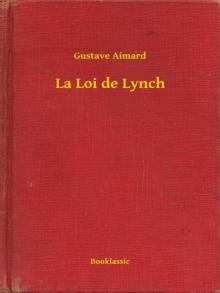 La loi de lynch. English
La loi de lynch. English The Guide of the Desert
The Guide of the Desert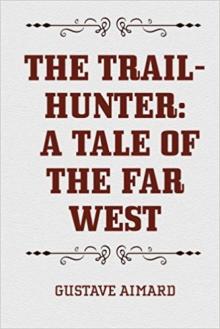 The Trail-Hunter: A Tale of the Far West
The Trail-Hunter: A Tale of the Far West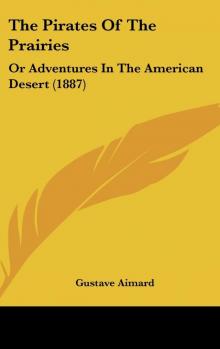 The Pirates of the Prairies: Adventures in the American Desert
The Pirates of the Prairies: Adventures in the American Desert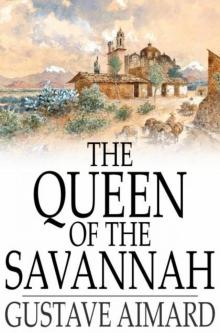 The Treasure of Pearls: A Romance of Adventures in California
The Treasure of Pearls: A Romance of Adventures in California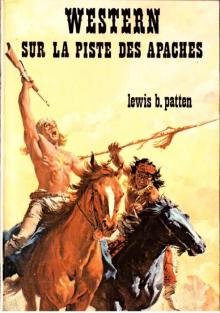 Les outlaws du Missouri. English
Les outlaws du Missouri. English Les trappeurs de l'Arkansas. English
Les trappeurs de l'Arkansas. English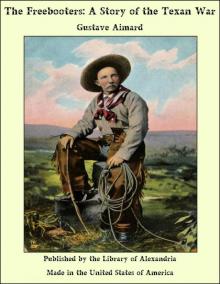 The Border Rifles: A Tale of the Texan War
The Border Rifles: A Tale of the Texan War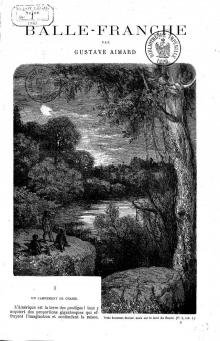 Balle-Franche. English
Balle-Franche. English The Queen of the Savannah: A Story of the Mexican War
The Queen of the Savannah: A Story of the Mexican War The Red Track: A Story of Social Life in Mexico
The Red Track: A Story of Social Life in Mexico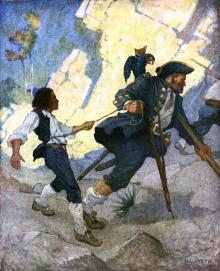 La fièvre d'or. English
La fièvre d'or. English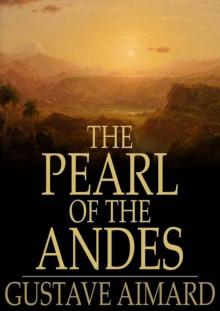 The Pearl of the Andes: A Tale of Love and Adventure
The Pearl of the Andes: A Tale of Love and Adventure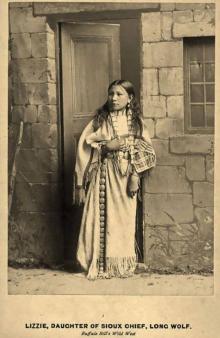 Les fils de la tortue. English
Les fils de la tortue. English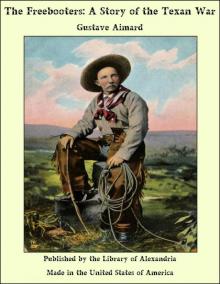 The Indian Chief: The Story of a Revolution
The Indian Chief: The Story of a Revolution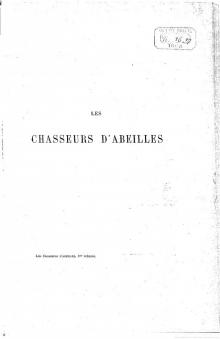 Les chasseurs d'abeilles. English
Les chasseurs d'abeilles. English The Adventurers
The Adventurers